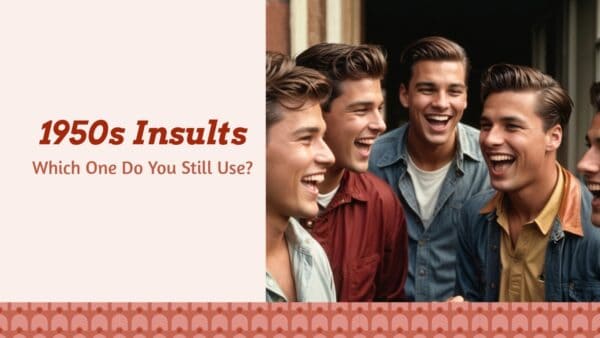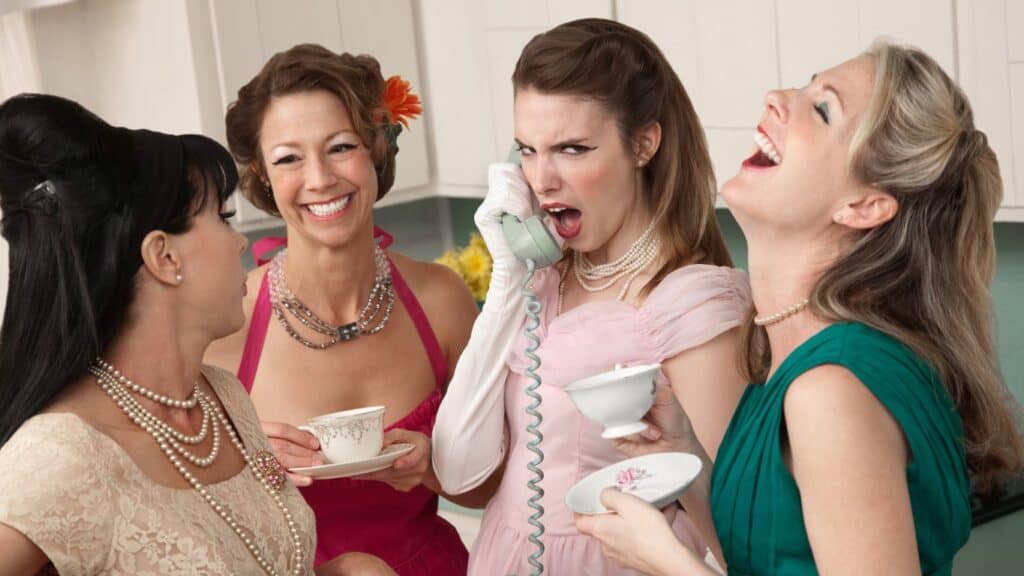In the 1950s, insults were at their sharpest. People back then had a way with words that could really sting.
Surprisingly, many of these insults still ring true today. Their power lies in their timeless quality and how effectively they express disapproval or make fun of someone.

Unlike slang used in the 50s which refers to informal language used within the generation can be light-hearted and inclusive. Insults, on the other hand, are intentionally hurtful or offensive expressions meant to offend someone. Insults can also be used to express frustration or annoyance, as well as to convey anger or irritation in a situation, Fudge!
Passed down through generations, these insults continue to strike a chord with people because they tap into experiences that everyone can relate to. So let’s travel back to the culture of the day and explore the world of these enduring and impactful insults from the 1950s.
Popular 50s Insults
Party Pooper
Meaning: A “party pooper” is someone who ruins the fun or excitement of a social gathering by being negative or uncooperative.
Example: “Don’t be such a party pooper; let’s enjoy the celebration!”
Heavens To Betsy
Meaning: “Heavens to Betsy” is an expression of surprise or astonishment, similar to saying “wow” or “oh my goodness.”
Example: “Heavens to Betsy! I can’t believe you did that!”
Riffraff
Meaning: “Riffraff” refers to people who are considered undesirable or of low social standing, often implying a lack of class or manners.
Example: “We don’t want any riffraff at our elegant dinner party.”
That’s So Mickey Mouse
Meaning: No. This has nothing to do with Mickey Mouse Club which was popular at the time. When something is described as “so Mickey Mouse,” it means it’s either very easy and requires little effort or it’s childish and silly.
Example: “Their excuse for being late was so Mickey Mouse; they just overslept.”
Stuff It
Meaning: “Stuff it” is a way to tell someone to be quiet or to stop talking, often used when someone is annoyed.
Example: “I’ve had enough of your complaining; why don’t you just stuff it?”
Scram
Meaning: “Scram” is an informal, forceful way to tell someone to go away or leave, often used when you want them out of your sight.
Example: “I’ve had enough of your nonsense. Scram!”
Oh, Fudge
Meaning: “Oh, fudge” is a mild exclamation or expression of frustration, often used as a replacement for a stronger, less polite word “Oh, Fu*k”.
Example: “Oh, fudge! I can’t believe I missed the last train.”
Square
Meaning: Boring and old-fashioned person
Example: “Don’t be such a silly square!”
Fuddy-Duddy
Meaning: If someone was called a “fuddy-duddy,” it meant they were perceived as old-fashioned or resistant to change.
Example: “He’s still using a typewriter? He’s quite the fuddy-duddy.”
Get Bent!
Meaning: “Get bent!” is a strong expression used to tell someone to go away or to show irritation and dismissal. It’s not a polite phrase.
Example: “I can’t believe she said that to you. You should’ve just told her to get bent!”
See You Later, Alligator
Meaning: This phrase was a casual and fun way to say goodbye to someone, often with the expected response being “In a while, crocodile.”
Example: “See you later, alligator! Have a great day at school!”
Baby, You’re the Ginchiest!
Meaning: “Ginchy” was 1950s slang for something that was considered cool or exciting. Telling someone they’re the “ginchiest” means you think they’re the coolest or the best.
Example: “You aced that test? Wow, baby, you’re the ginchiest!”
Ninny
Meaning: “Ninny” is an old-fashioned term used to describe someone who is foolish, simple, or easily confused.
Example: “Stop acting like a ninny and make a decision.”
Pill
Meaning: Calling someone a “pill” in the 1950s was a way of saying they were a bore or a killjoy.
Example: “Don’t be such a pill; let’s have some fun!”
Goofball
Meaning: A “goofball” refers to someone who is silly, eccentric, or acts in a foolish manner.
Example: “He’s a total goofball, always cracking jokes.”
Old Fogey
Meaning: An “old fogey” is a somewhat derogatory term for an older person who is seen as outdated or traditional in their thinking or behavior.
Example: “He’s such an old fogey; he refuses to use modern technology.”
Drop Dead
Meaning: “Drop dead” is a harsh and offensive phrase that is used to tell someone to go away in a rude and dismissive manner.
Example: “I don’t want to talk to you anymore; just drop dead!”
Dull as Dishwater
Meaning: “Dull as dishwater” is an idiom used to describe something or someone as extremely uninteresting, boring, or lacking in excitement or liveliness just like the water used for washing dishes.
Example: “The lecture was as dull as dishwater; I struggled to stay awake throughout the entire presentation.”
Used Mostly by Men or To Describe Men
Buffoon
Meaning: A buffoon is like the jesters of old, the court entertainers who used humor and absurdity to reveal the truths hidden behind masks of dignity. In a world where seriousness reigns, a buffoon boldly dons the cloak of folly, wielding laughter as a mirror to reflect the absurdities of life, forcing us to question the very seriousness we hold dear. A buffoon is the whimsical rebel of reason, the mischievous trickster who dances on the line between wisdom and absurdity, inviting us to join the dance of laughter and reflection.
Example: “Joe became known as the office buffoon for his hilarious impersonations of famous celebrities at the annual company party.”
Blockhead
Meaning: A person who is considered foolish or stupid.
Example: “Don’t be such a blockhead; it’s obvious she’s not interested.”
Knuckle Sandwich
Meaning: “Knuckle sandwich” is a humorous way to threaten someone with physical harm, implying a punch in the face.
Example: “If you don’t stop teasing me, I’ll give you a knuckle sandwich!”
Dimwit
Meaning: Someone lacking intelligence or common sense.
Example: “Only a dimwit would believe such a ridiculous story.”
Muttonhead
Meaning: A person seen as slow-witted or gullible.
Example: “He’s a muttonhead if he thinks that excuse will work.”
Lamebrain
Meaning: An individual perceived as having a slow or dull intellect.
Example: “You’re such a lamebrain if you can’t solve this simple puzzle.”
Dunderhead
Meaning: A person characterized by stupidity or a lack of common sense.
Example: “That dunderhead couldn’t find his way out of a paper bag.”
Numbnuts
Meaning: Refers to someone considered foolish or inept.
Example: “Only a numbnuts would try to fix a car without knowing anything about it.”
Knucklehead
Meaning: An individual seen as silly or dim-witted.
Example: “Stop acting like a knucklehead and pay attention!”
Lunkhead
Meaning: Someone perceived as slow-thinking or clumsy.
Example: “He’s a lunkhead if he thinks that plan will work.”
Neanderthal
Meaning: An insulting term suggesting someone is primitive or backward.
Example: “His attitude is so outdated; he’s like a neanderthal.”
Simpleton
Meaning: A person lacking intelligence or common sense.
Example: “Don’t be such a simpleton; use your brain!”
Rube
Meaning: An unsophisticated country person
Example: “That rube wouldn’t know style if it hit him in the face.”
Beatnik
Meaning: Nonconformist creative type
Example: “He’s just another weird beatnik from the Village.”
Commie
Meaning: Communist sympathizer
Example: “Be careful what you say, he could be a commie.”
Joe College
Meaning: Preppy college guy
Example: “There goes Joe College in his letterman jacket.”
Wet Rag
Meaning: Referring to someone as a “wet rag” implied that they were uninteresting or lacking energy and enthusiasm.
Example: “Ever been to a party with that one person sulking in the corner? That person is what we’d call a wet rag.”
Drip
Meaning: Similar to a wet rag, a “drip” was someone who was perceived as uncool or boring, someone you wouldn’t want to spend time with.
Example: “Nobody wants to be labeled as a drip; it means you’re no fun.”
Square
Meaning: If someone was called a “square,” it meant they were seen as conventional or out of touch with the latest trends and culture.
Example: “In Texas, being labeled a square in a world of trendsetters just won’t cut it.”
Jellybean
Meaning: In this context, “jellybean” referred to someone who was considered weak or easily frightened, much like a fragile candy.
Example: “Don’t act like a jellybean; have some courage and stand up for yourself.”
Daddy-O
Meaning: Although sometimes used affectionately, “Daddy-O” could also be used mockingly to describe someone who was trying too hard to be cool or stylish.
Example: “See that guy in the leather jacket, attempting to be all suave? He’s trying to be a Daddy-O.”
Bird Dog
Meaning: A “bird dog” was a term for a guy who tried to steal someone else’s girlfriend, which was seen as disloyal and sneaky.
Example: “Keep an eye on him; he’s acting like a bird dog, trying to get close to your girlfriend.”
Rat Fink
Meaning: “Rat fink” was an insult used to call someone a traitor or a snitch, someone who couldn’t be trusted.
Example: “Don’t trust him; he’s a real rat fink, always spilling secrets.”
Flip Your Lid
Meaning: To “flip your lid” means to become very upset or lose your temper.
Example: “I got home late last night, and my mom totally flipped her lid when she found out.”
Make Like a Tree and Get Outta Here
Meaning: This humorous phrase, although often misquoted as “Make like a tree and get outta here,” is correctly “Make like a tree and leave.” It’s used to tell someone to go away or exit.
Example: “I don’t want to see you around here anymore. Make like a tree and leave.”
Used Mostly by Women or To Describe Women
Airhead
Meaning: A woman who is perceived as silly or lacking in intelligence.
Example: “She’s a total airhead; she can’t hold a meaningful conversation.”
Ditz
Meaning: A term used to describe a woman who is scatterbrained or forgetful.
Example: “She’s such a ditz; she forgot her own birthday.”
Drama Queen
Meaning: A woman who tends to exaggerate situations for attention.
Example: “She’s such a drama queen, turning a minor issue into a crisis.”
Prima Donna
Meaning: A woman who is seen as demanding, temperamental, or self-centered.
Example: “She acts like a prima donna, always needing special treatment.”
Fusspot
Meaning: A woman who is overly concerned with trivial details.
Example: “She’s a real fusspot, nitpicking about everything.”
Gossiper
Meaning: A woman who habitually spreads rumors or engages in gossip.
Example: “She’s such a gossiper; she can’t keep a secret.”
Hysterical
Meaning: Describes a woman who reacts emotionally and irrationally to situations.
Example: “She became hysterical over a minor disagreement.”
Shrill
Meaning: A term used to criticize a woman for having a high-pitched and irritating voice.
Example: “Her shrill voice made it impossible to concentrate.”
Busybody
Meaning: A woman who meddles in other people’s affairs or is overly nosy.
Example: “She’s such a busybody, always asking intrusive questions.”
High-maintenance
Meaning: Describes a woman who is demanding and requires a lot of attention and effort.
Example: “She’s so high-maintenance; it’s exhausting to be around her.”
Tomboy
Meaning: A girl who acts like a boy
Example: “Stop being such a tomboy and act like a lady.”
Floozie
Meaning: A disreputable or overly made-up woman
Example: “She’s such a floozie with all that makeup.”
Battleaxe
Meaning: A domineering woman
Example: “Don’t upset your battleaxe of a mother-in-law.”
Gasper
Meaning: An awkward, ugly girl
Example: “She’s such a gasper, poor thing.”
Bird Brain
Meaning: “Bird brain” was a playful way to describe someone as silly or lacking common sense, as if their intelligence were as small as a bird’s.
Example: “He forgot his keys again? What a bird brain!”
Ankle-Biter
Meaning: This humorous term was used to refer to small children, especially those who were energetic and causing a commotion.
Example: “At family gatherings in Texas, you can expect ankle-biters to be running around, making noise.”
The Art of Insulting

Back in the 1950s, it was common for people to express their displeasure with an annoying or stupid person by throwing around phrases like “stuff it” and “get bent.” These words clearly indicate that one should stop speaking, yet they still have a powerful effect today despite sounding somewhat dated.
So why is this? Examining the cultural backdrop of these insults helps explain why they remain so effective even now.
Cultural Context
In the 1950s, insults were used to portray individuals based on attitudes and values of the period. With clever use of mickey mouse phrases that expressed wit and playfulness came “scram”, a popular way for someone to be told off!

An eccentric person was called a “Fuddy-Duddy”, while somebody who lacked humor, money or good manners would have been labeled as a “Gentleman of Four Outs”. For those particularly proud about their word choice in conversations, they’d bear with being referred as “Word Grubbers.” Another phrase born during this era is ‘party pooper’, one meant to describe some despicable character around them.
1950s insults had enough power within words that colorful descriptions could summarize someone’s personality very accurately.
Today’s expressions are considered much milder compared from before. Nonetheless examples such past aphorisms still remain significant lessons when it comes down teaching us how powerful language can be.

Modern Relevance
Jumping to the present times, it’s no surprise that many of these 1950s insults have carried over into contemporary society. People today still use them as creative ways to describe a foolish or stupid person – such is the case with an expression like “Oh Fudge-a-roo!” which could be said when referring sarcastically in regards to someone acting up (like an ankle biter).
Similarly, there’s another classic insult known as “knuckle sandwich” but its purpose has changed slightly. This phrase is often used now more for entertainment purposes and humor than anything else.
Bringing back vintage jabs helps our language stay fresh and exciting – words can hold so much power!
David Rappaport once made note on how if you sneak some unexpected phrases including “drop dead” during a heated conversation it will probably take your opponent by shock and make everyone laugh while also breaking down tension from the situation.
Accordingly, one idea behind why people resort toward those old school phrases would be because they offer something new out of what were usually usual insults each time around.
Many insults from the 1950s have aged well and remain pertinent today. Their language conveys values of their era while demonstrating mastery in the art of zingers. So if you’re engaged in an argument or debate, it might be worth channeling your inner ‘50s hipster by giving out some vintage jibes for a hint of nostalgia!
